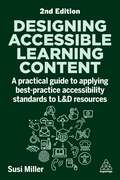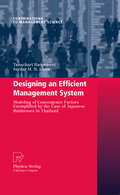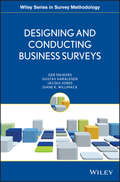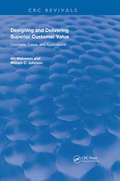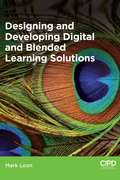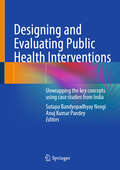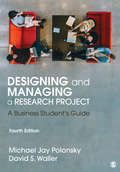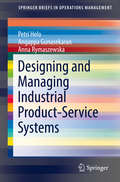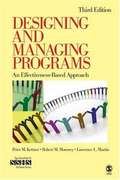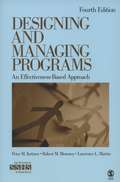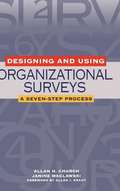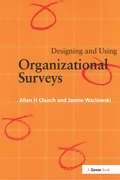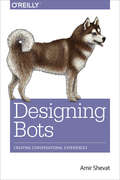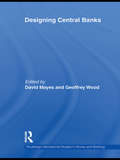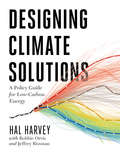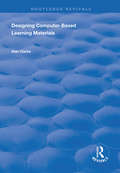- Table View
- List View
Designing Accessible Learning Content: A Practical Guide to Applying best-practice Accessibility Standards to L&D Resources
by Susi MillerMaking learning and development (L&D) content inclusive and accessible for everyone is not only a good thing to do, it's the right thing to do.Designing Accessible Learning Content is a practical guide on accessibility for anyone involved in the design, creation, development or testing of online learning content. Now updated to include detailed guidelines on the Web Content Accessibility Guidelines and the nine new standards, this book provides HR and OD professionals and academics with evidence-based advice on designing inclusive digital learning content.Featuring real-world examples from industry-leading brands, this book demonstrates how accessible learning content can improve usability and provide the best possible learning experience for all. It is an essential handbook for all L&D professionals seeking to harness the benefits of accessibility in order to improve their learning content for everyone.
Designing an Efficient Management System
by Tanachart Raoprasert Sardar M. IslamThis book makes a significant and valuable contribution to the literature in the fields of organisational behaviour and design, performance analysis and structural equation modelling. The subject of this book is the development of an efficient and effective management system in the globalised world in order to improve overall organizational performance to achieve good corporate governance by reducing agency costs in a cross-cultural environment. Based on an empirical case study of Japanese management practices in Thailand, it examines factors that help to adapt management practices to the work culture of the host country and motivate local employees to adapt and implement unfamiliar management practices. The book provides a new methodological approach by applying structural equation modeling to psychosocial and motivational constructs of organizational performance, and thus presents an innovative behavioral framework of organizations in a contemporary cross-cultural setting.
Designing and Conducting Business Surveys
by Ger Snijkers Gustav Haraldsen Jacqui Jones Diane K. WillimackDesigning and Conducting Business Surveys provides a coherent overview of the business survey process, from start to finish. It uniquely integrates an understanding of how businesses operate, a total survey error approach to data quality that focuses specifically on business surveys, and sound project management principles. The book brings together what is currently known about planning, designing, and conducting business surveys, with producing and disseminating statistics or other research results from the collected data. This knowledge draws upon a variety of disciplines such as survey methodology, organizational sciences, sociology, psychology, and statistical methods. The contents of the book formulate a comprehensive guide to scholarly material previously dispersed among books, journal articles, and conference papers. This book provides guidelines that will help the reader make educated trade-off decisions that minimize survey errors, costs, and response burden, while being attentive to survey data quality. Major topics include: * Determining the survey content, considering user needs, the business context, and total survey quality * Planning the survey as a project * Sampling frames, procedures, and methods * Questionnaire design and testing for self-administered paper, web, and mixed-mode surveys * Survey communication design to obtain responses and facilitate the business response process * Conducting and managing the survey using paradata and project management tools * Data processing, including capture, editing, and imputation, and dissemination of statistical outputs Designing and Conducting Business Surveys is an indispensable resource for anyone involved in designing and/or conducting business or organizational surveys at statistical institutes, central banks, survey organizations, etc. ; producing statistics or other research results from business surveys at universities, research organizations, etc. ; or using data produced from business surveys. The book also lays a foundation for new areas of research in business surveys.
Designing and Delivering Superior Customer Value: Concepts, Cases, and Applications (Routledge Revivals)
by Art Weinstein William C. JohnsonFirst Published in 1999: This book stresses the service aspects of an organization - especially customer service, marketing, and organizational responsiveness, and how to create and provide outstanding customer value to the target market(s).
Designing and Developing Digital and Blended Learning Solutions
by Mark LoonDesigning and Developing Digital and Blended Learning Solutions is essential reading for anyone studying the Level 5 CIPD L&D module of the same name as well as all learning and development professionals looking to understand the growing role of technology in L&D. Covering both current and emerging learning technologies, this book will help readers assess which technologies are right for their needs. It also covers how to design blended learning solutions, how to develop digital learning content as well as how to evaluate the effectiveness of this digital content. Most importantly, Designing and Developing Digital and Blended Learning Solutions provides guidance on how to implement digital and blended learning solutions including identifying the appropriate platforms and the roles, tools and processes needed to support effective implementation. Full of practical examples and advice, this is an invaluable guide for students and practitioners alike.
Designing and Evaluating Public Health Interventions: Unwrapping the key concepts using case studies from India
by Sutapa Bandyopadhyay Neogi Anuj Kumar PandeyThis book covers all aspects of public health interventions, emphasizing the design, implementation, and evaluation of such initiatives. Section I provides information ranging from fundamental concepts of designing an intervention to its implementation and scalability. Section II highlights evidence around interventions to address pressing public health concerns through interesting case studies from India, that offer practical insights for better understanding. This book is relevant for researchers and academicians in public health, epidemiology, health management and economics, health policy, and allied branches. It equips readers to design and analyze interventions to improve practice.
Designing and Managing a Research Project: A Business Student's Guide
by Michael J. Polonsky David S. WallerDesigning and Managing a Research Project: A Business Student’s Guide, Third Edition is a practical, step-by-step guide that shows business students how to successfully conduct a research project, from choosing the topic to presenting the results. Michael Jay Polonsky and David Scott Waller have applied their many years of experience in supervising student projects to provide examples of actual research problems and to offer practical solutions. Unique to this book is the inclusion of chapters on topics such as supervision, group work and ethics, and both qualitative and quantitative data analysis, with links provided to a range of online resources, as well as examples from student projects.
Designing and Managing a Research Project: A Business Student's Guide
by Michael J. Polonsky David S. WallerDesigning and Managing a Research Project: A Business Student’s Guide, Third Edition is a practical, step-by-step guide that shows business students how to successfully conduct a research project, from choosing the topic to presenting the results. Michael Jay Polonsky and David Scott Waller have applied their many years of experience in supervising student projects to provide examples of actual research problems and to offer practical solutions. Unique to this book is the inclusion of chapters on topics such as supervision, group work and ethics, and both qualitative and quantitative data analysis, with links provided to a range of online resources, as well as examples from student projects.
Designing and Managing a Research Project: A Business Student′s Guide
by Michael J. Polonsky David S. WallerDesigning and Managing a Research Project: A Business Student’s Guide is a practical, step-by-step guide that shows business students how to successfully conduct a research project, from choosing the topic to presenting the results. The authors have applied their many years of experience in supervising student projects to provide examples of actual research problems and to offer practical solutions. The inclusion of topics such as supervision, group work and ethics, and both qualitative and quantitative data analysis, along with examples from real student research provide a unique perspective. The new Fourth Edition includes broader types of student project examples, such as an Economics thesis, additional international business cases, increased coverage of Questionnaire Design and Institutional Review Boards, and an integrated case throughout the book on "High Performance Shoes" with supporting materials and data. Additional resources including case studies, PowerPoint slides, and test bank are available on the authors’ website.
Designing and Managing a Research Project: A Business Student′s Guide
by Michael J. Polonsky David S. WallerDesigning and Managing a Research Project: A Business Student’s Guide is a practical, step-by-step guide that shows business students how to successfully conduct a research project, from choosing the topic to presenting the results. The authors have applied their many years of experience in supervising student projects to provide examples of actual research problems and to offer practical solutions. The inclusion of topics such as supervision, group work and ethics, and both qualitative and quantitative data analysis, along with examples from real student research provide a unique perspective. The new Fourth Edition includes broader types of student project examples, such as an Economics thesis, additional international business cases, increased coverage of Questionnaire Design and Institutional Review Boards, and an integrated case throughout the book on "High Performance Shoes" with supporting materials and data. Additional resources including case studies, PowerPoint slides, and test bank are available on the authors’ website.
Designing and Managing Industrial Product-Service Systems
by Petri Helo Angappa Gunasekaran Anna RymaszewskaThis book is dedicated to the issues and complexities of industrial services supply chain management. It analyzes how the transition from products to services can be managed, and how supply chains can be adjusted to reflect this new status quo. The book begins with chapters examining product-service systems structures and servitization - the services infusion process. Next, it presents industrial services as marketing and operations strategy. The focus shifts to service delivery, and this chapter discusses how the actual operations take place. This is followed by an examination of the role of technology and how connected assets are utilized by product vendors in value-creation. The book analyzes the transition from ownership to subscriptions in the pricing decisions chapter. Then the value chain effects chapter offers an overview of the mechanisms through which industrial companies are shortening the distance to end-users and aim for a better position in the value chain. Finally the conclusion addresses theoretical and empirical implications in the industrial services supply chain management.
Designing and Managing Programs: An Effectiveness-Based Approach
by Peter M. Kettner Lawrence L. Martin Robert M. MoroneyDesigning and Managing Programs: An Effectiveness-Based Approach, Third Edition, is an updated version of THE classic book on program management and design. This new edition is written in a deliberate manner that has students following the program planning process in a logical manner. Students will learn to track one phase to the next, resulting in a solid understanding of the issues of internal consistency and planning integrity. The book's format guides students from problem analysis through evaluation, enabling students to apply these concepts to their own program plans.
Designing and Managing Programs: An Effectiveness-Based Approach
by Peter M. Kettner Lawrence L. Martin Robert M. MoroneyDesigning and Managing Programs: An Effectiveness-Based Approach, Fourth Edition, is an updated version of THE classic book on program planning, design, and implementation. This new edition is written in a deliberate manner designed to help students logically follow the program planning process. Students will learn to track one phase to the next, resulting in a solid understanding of the issues of internal consistency and planning integrity. The book's format guides students from problem analysis through evaluation, enabling them to apply these concepts to their own program plans.
Designing and Using Organizational Surveys
by Allan H. Church Janine WaclawskiThis book will serve as an excellent primer for executives and practitioners who are about to embark on an organizational survey
Designing and Using Organizational Surveys: A Seven-step Process (Business And Management Ser.)
by Allan H. Church Janine WaclawskiOrganizational surveys are widely recognized as a powerful tool for measuring and improving employee commitment. If poorly designed and administered, however, they can create disappointment and cynicism. There are many excellent books on sampling methodology and statistical analysis, but little has been written so far for those responsible for designing and implementing surveys in organizations. Now Allan H Church and Janine Waclawski have drawn on their extensive experience in this field to develop a seven-step model covering the entire process, from initiation to final evaluation. They explain in detail how to devise and administer different types of organizational surveys, leading the reader systematically through the various stages involved. Their text is supported throughout by examples, specimen documentation, work sheets and case studies from a variety of organizational settings. They pay particular attention to the political and human sensitivities concerned and show how to surmount the many potential barriers to a successful outcome. Designing and Using Organizational Surveys is a highly practical guide to one of the most effective methods available for organizational diagnosis and change.
Designing Behavioural Insights for Policy: Processes, Capacities & Institutions (Elements in Public Policy)
by Ishani Mukherjee Assel MussagulovaThe diversity of knowledge surrounding behavioural insights (BI) means in the policy sciences, although visible, remains under-theorized with scant comparative and generalizable explorations of the procedural prerequisites for their effective design, both as stand-alone tools and as part of dedicated policy 'toolkits'. While comparative analyses of the content of BI tools has proliferated, the knowledge gap about the procedural needs of BI policy design is growing recognizably, as the range of BI responses grows in practice necessitating specific capabilities, processes and institutional frameworks to be in place for their design. This Element draws on the literature on policy design and innovation adoption to explore the administrative, institutional and capacity endowments of governments for the successful and appropriate integration of BI in existing policy frameworks. Further, we present three illustrative cases with respect to their experience of essential procedural endowments facilitating for the effective integration of BI in policy design.
Designing Bots: Creating Conversational Experiences
by Amir ShevatFrom Facebook Messenger to Kik, and from Slack bots to Google Assistant, Amazon Alexa, and email bots, the new conversational apps are revolutionizing the way we interact with software. This practical guide shows you how to design and build great conversational experiences and delightful bots that help people be more productive, whether it’s for a new consumer service or an enterprise efficiency product.Ideal for designers, product managers, and entrepreneurs, this book explores what works and what doesn’t in real-world bot examples, and provides practical design patterns for your bot-building toolbox. You’ll learn how to use an effective onboarding process, outline different flows, define a bot personality, and choose the right balance of rich control and text.Explore different bot use-cases and design best practicesUnderstand bot anatomy—such as brand and personality, conversations, advanced UI controls—and their associated design patternsLearn steps for building a Facebook Messenger consumer bot and a Slack business botExplore the lessons learned and shared experiences of designers and entrepreneurs who have built botsDesign and prototype your first bot, and experiment with user feedback
Designing Brand Identity: An Essential Guide for the Whole Branding Team
by Alina Wheeler<p>A revised new edition of the bestselling toolkit for creating, building, and maintaining a strong brand <p>From research and analysis through brand strategy, design development through application design, and identity standards through launch and governance, Designing Brand Identity, Fourth Edition offers brand managers, marketers, and designers a proven, universal five-phase process for creating and implementing effective brand identity. Enriched by new case studies showcasing successful world-class brands, this Fourth Edition brings readers up to date with a detailed look at the latest trends in branding, including social networks, mobile devices, global markets, apps, video, and virtual brands.</p>
Designing Brand Identity: A Comprehensive Guide to the World of Brands and Branding
by Alina Wheeler Rob MeyersonIt’s harder than ever to be the brand of choice―in many markets, technology has lowered barriers to entry, increasing competition. Everything is digital and the need for fresh content is relentless. Decisions that used to be straightforward are now complicated by rapid advances in technology, the pandemic, political polarization, and numerous social and cultural changes. The sixth edition of Designing Brand Identity has been updated throughout to address the challenges faced by branding professionals today. This best-selling book demystifies branding, explains the fundamentals, and gives practitioners a roadmap to create sustainable and successful brands. With each topic covered in a single spread, the book celebrates great design and strategy while adding new thinking, new case studies, and future-facing, global perspectives.
Designing Central Banks (Routledge International Studies in Money and Banking)
by David MayesThe activities of central banks are relevant to everyone in society. This book starts by considering how and why in general central banks evolved and specifically the special aspects of the contribution of the Northern European Central Banking Tradition. With that foundation, the book will then turn to a series of contemporary themes. Firstly, this book looks at independence, how central banks can actually influence their respective economies, goals, responsibilities and governance. This collection of papers, formulated from the joint conference of the Bank of Finland and the Deutsche Bundesbank in November 2007, will help motivate continuing research into the institutional design of central banks and promote a better understanding of the many challenges central banks are facing today. This volume gives a detailed perspective on the benefits of price stability and central bank independence and, due to the advances in macroeconomic theory, has prompted a substantial rethink on central banks’ institutional design. With contributions from such scholars as Anne Sibert and Forrest Capie and a foreword by Erkki Liikanen and Professor Axel A. Weber, this volume will be useful reading for monetary economists around the world as well as all those with an interest in central banks and banking more generally.
Designing Channels of Distribution
by V. Kasturi RanganPresents a framework and a method for addressing the new product channel choice decision. Offers a six-step method that involves: 1) disaggregating and prioritizing a distribution channel by customers' channel function requirements; 2) obtaining and combining customers' (and key informants) evaluations of the channel functions; 3) benchmarking existing channels (own as well as competitors'); 4) identifying and constructing effective channel alternatives; 5) quantifying the short-term and long-term benefits and costs of each alternative; and 6) selecting the appropriate channel by trading off the opportunities versus constraints posed by existing channel networks (if applicable). The method requires extensive management participation to facilitate its implementation. Provides an illustrative application to demonstrate its managerial usefulness.
Designing Climate Solutions: A Policy Guide for Low-Carbon Energy
by Hal Harvey Robbie Orvis Jeffrey RissmanWith the effects of climate change already upon us, the need to cut global greenhouse gas emissions is nothing less than urgent. It's a daunting challenge, but the technologies and strategies to meet it exist today. A small set of energy policies, designed and implemented well, can put us on the path to a low carbon future. Energy systems are large and complex, so energy policy must be focused and cost-effective. One-size-fits-all approaches simply won't get the job done. Policymakers need a clear, comprehensive resource that outlines the energy policies that will have the biggest impact on our climate future, anddescribes how to design these policies well.Designing Climate Solutions:A Policy Guide for Low-Carbon Energy is the first such guide, bringing together the latest research and analysis around low carbon energy solutions. Written by Hal Harvey, CEO of the policy firm Energy Innovation, with Robbie Orvis and Jeffrey Rissman of Energy Innovation, Designing Climate Solutions is an accessible resource on lowering carbon emissions for policymakers, activists, philanthropists, and others in the climate and energy community. In Part I, the authors deliver a roadmap for understanding which countries, sectors, and sources produce the greatest amount of greenhouse gas emissions, and give readers the tools to select and design efficient policies for each of these sectors. In Part II, they break down each type of policy, from renewable portfolio standards to carbon pricing, offering key design principles and case studies where each policy has been implemented successfully.We don't need to wait for new technologies or strategies to create a low carbon future—and we can't afford to. Designing Climate Solutions gives professionals the tools they need to select, design, and implement the policies that can put us on the path to a livable climate future.
Designing Companywide Transition-Acceleration Systems: Basic Design Principles
by Michael D. WatkinsWhile there are many different types of transitions leaders will go through in their careers, there are certain underlying imperatives that are fundamental to all of them: to diagnose the situation rapidly and well, to crystallize the organizational-change and personal development challenges, to craft a plan that creates momentum, and to manage them for personal excellence. What are the implications for how companies should accelerate key transitions? In this chapter, transition acceleration expert Michael Watkins briefly outlines principles developed over years of working with leading companies that can be applied to build a transition-acceleration solution that's right for your company. This chapter was originally published as the Conclusion of "Your Next Move: The Leader's Guide to Navigating Major Career Transitions."
Designing Computer-Based Learning Materials (Routledge Revivals)
by Alan ClarkeFirst published in 2001, this volume demonstrates how computer-based learning has the potential to provide a highly motivating learning experience, that it also has the potential to achieve exactly the opposite, and that the difference between these two extremes is the quality of the learning design. The challenge for the learning designer isn’t a simple one. You are being asked to prepare interactive learning for someone you can’t see and with whom the only interaction you are likely to have is via limited written communication. Fortunately help is at hand in Alan Clarke’s Designing Computer-Based Learning Materials. Dr. Clarke offers a definitive guide to each of the many elements involved in good design. This book explores the principles of adult learning, and relates to the potential, features and impact of computer-based learning. This is not a ‘how to…’ book, but rather one seeking to help you understand the different elements which go into computer-based learning. If you are commissioning material, it will help you to understand the contractors’ constraints. If you are designing materials yourself, it will allow you to avoid many of the errors it is all too easy to make when developing them. Computer-based learning materials are not all the same: their range reflects the variety of learners that use them and purposes they are used for; the different learning environments that are available to people; the different subjects that they wish to learn and the level to which they wish to take them. In the face of such a complex task, involving so many factors and variables, it is essential that the learning designer understands what is involved and uses a rigorous process for envisioning, planning, designing, implementing and testing their solution. This is a book about learning design and not about software production and, as such, it provides any aspiring designers with the fundamentals of producing the highly motivating learning experience, which should be their objective.
Designing, Conducting, and Publishing Quality Research in Mathematics Education (Research in Mathematics Education)
by Keith R. LeathamThe purpose of this book is to collect, organize and disseminate collective wisdom with respect to designing, conducting, and publishing quality research in mathematics education. This wisdom will be gleaned from among those who, over the past several decades, have been instrumental in guiding the field in the pursuit of excellence in mathematics education research—insightful editors, educative reviewers, prolific writers, and caring mentors. Each chapter is written to the novice researcher with the intent of aiding them in avoiding common pitfalls, navigating difficult intellectual terrain, and understanding that they are not alone in experiencing rejection, frustration, confusion, and doubt. This book differs from existing literature in the sense that it is written about the enterprise of designing, conducting and publishing research in mathematics education as opposed to being reports of the results of such work. It also differs in the sense that it is written with the intent to mentor the rising generation as opposed to capture the state of the field (as would happen in a handbook, for example). It is written for the express purpose of helping the field work collectively to aid in the often isolated enterprise of mentoring new researchers. The primary audience is a potentially wide one: graduate students, novice researchers, graduate faculty, advisors, and mentors – or anyone seeking to improve their own abilities to design, conduct, and publish quality research in mathematics education.
